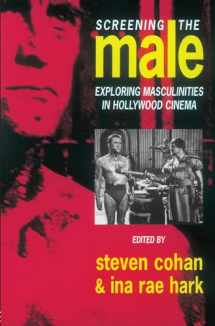
Screening the Male
Book details
Summary
Description
Screening the male re-examines the problematic status of masculinity both in Hollywood cinema and feminist film theory.
Classical Hollywood cinema has been theoretically established as a vast pleasure machine, manufacturing an idealized viewer through its phallocentric ideological apparatus. Feminist criticism has shown how difficult it is for the female viewer to resist becoming implicated in this representational system. But the theroies have overlooked the significance of the problem itself - of the masuline motivation at the core of the system. The essays here explore those male characters, spectators, and performers who occupy positions conventionally encoded as "feminine" in Hollywood narrative and questions just how secure that orthodox male position is.
Screening the Male brings together an impressive group of both established and emerging scholars from Britain, the United States and Australia unified by a concern with issues that film theorists have exclusively inked to the femninie and not the masculne: spectacle, masochism, passivity, masquerade and, most of all, the body as it signifies gendered, racial, class and generatonal differences.


We would LOVE it if you could help us and other readers by reviewing the book
Book review



